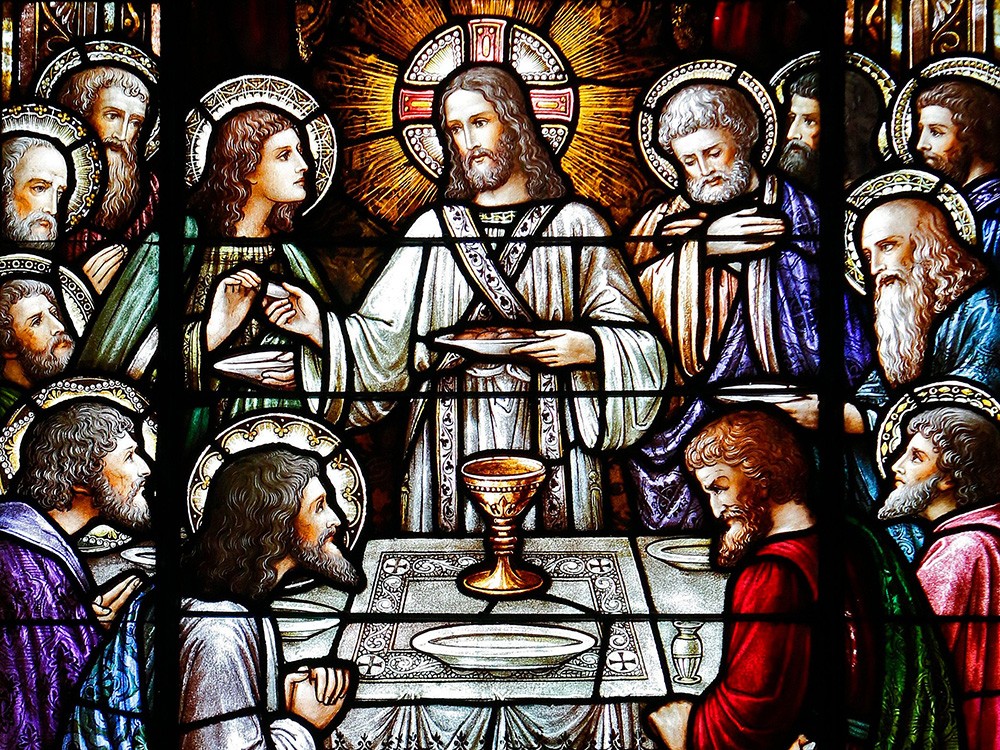
Jesus and his apostles at the Last Supper, depicted in a stained glass window at St. Aloysius Church in Great Neck, New York, in this undated file photo. Today's Gospel comes from Jesus' last discourse, John's record of Jesus' long dinner conversation on the night of his betrayal. (OSV News/Gregory A. Shemitz)
"I've thought about it, and I'm right." That's the line the mother of one of our sisters used whenever necessary. While we might think it's pretty bold, most of us would have to admit that we often share that often overly confident opinion. Strong conviction is not a bad thing, provided we abandon illusions of infallibility.
Another expression of the potential problem is what New York Times columnist David Brooks described as a crisis of serious thinking. Among other things, he warned that our nation is losing the "ability to reason," asking, "What happens when people lose the ability to ... render good judgments?" In a way, he's saying that we're losing the ability to "think about it," even while we remain convinced that we're right.
The Sixth Sunday of Easter invites us to think hard and invite the Holy Spirit to draw us beyond any narrowness and the fear of change that makes us cling to the familiar. (Note the first-person plural there!) Today's Gospel comes from Jesus' last discourse, John's record of Jesus' long dinner conversation on the night of his betrayal. John's Chapter 14 repeatedly affirms Jesus' promise that the Spirit will remain with the disciples (us). In Verses 15-16, Jesus says, "I will ask the Father who will give you another Advocate to be with you always."
Today's Gospel reiterates his promise, saying that the Holy Spirit "will teach you everything and remind you of all that I have told you."
Learning from the Spirit underlies our story from Acts. As the Christian community grew, polarization began to fester among them. More gentiles than Jews were choosing to follow Christ, and that caused some of the original group to worry that newcomers would dilute the true faith. To prevent that, they insisted that everyone entering the church should follow the traditions of pious Judaism, including the requirement that the men must be circumcised. The people promoting this position were arguing on behalf of their very identity: Christ was born a Jew and died a Jew. So too should be his followers.
As Luke indicates, "This caused no little dissension" or, more plainly, they nearly came to blows over it. Speaking up for the gentiles, Peter declared, "God who knows the heart, bore witness by granting [the gentiles] the Holy Spirit just as he did us." Peter insisted that there was no need for gentiles to become Jews, only to live as people permeated by God's Spirit.
What did they do? They followed the synodal path. After discussing the issue, the community in Antioch sent Paul and Barnabas, the "son of encouragement," and some others to meet with the community in Jerusalem and proclaim all that God was working among the gentiles (Acts 15:12). They carried a letter from the whole community that explained their discernment. After listening to one another and invoking the Holy Spirit, they boldly pronounced, "It is the decision of the Holy Spirit and of us" not to place undue burdens on the gentiles.
Advertisement
German theologian Karl Rahner taught that this decision counted as one of the three most important moments in the history of the church. (The other two, he said, were the Incarnation and the 1962-65 Second Vatican Council.) With this decision, the community opened itself to be a gathering of all people. Without it, Christianity probably would have remained a small sect within the Jewish community. (For Rahner, Vatican II ratified this decision by gathering bishops native to all the continents, thereby definitively opening the church to the diversity of cultures and viewpoints that would give it a future.)
And today? We live in a time of unprecedented polarization in society and even in the church. Too many of us maintain a spirit of "I've thought about it, and I'm right." The danger with this is that we leave little room for the Spirit. We don't approach others with the kind of prayerful, open hearts that allow us to comprehend various sides of an issue and discover new, community-building resolutions. What the disciples came to was not "I've thought about it ..." but the humble and faith-filled ability to announce boldly, "It is the decision of the Holy Spirit and of us ..."
Following what Vatican II started, Pope Francis led the church into this era of synodality — gathering the widest possible diversity of Catholics of different ages, opinions and backgrounds to listen attentively for what the Holy Spirit wishes to do among us. There is no doubt that the Spirit can inspire us, as long as we remember that inspiration is not a direct line from heaven, but communal discernment, even though it may entail no little dissension on the way to creative solutions.
Today's liturgy asks us one stark question, "Do you have the humility and courage to allow the Spirit to permeate you, moving you beyond your cherished convictions into a genuinely new era?"





